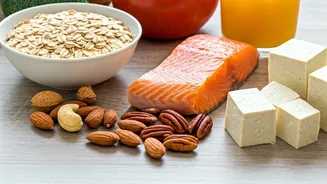Oatmeal for Heart Health
Oatmeal stands out as a superb choice for those aiming to diminish cholesterol. The presence of soluble fiber in oats acts like a sponge, soaking up cholesterol in the
digestive system and preventing its absorption into the bloodstream. This fiber binds to cholesterol and facilitates its elimination from the body. Moreover, oatmeal is simple to incorporate into one's diet; a bowl in the morning can provide a significant boost to your fiber intake. This makes it a practical and delicious way to begin your day while supporting heart health. Remember to opt for whole oats, which deliver the maximum fiber benefits, and enjoy with fruits and nuts for enhanced nutritional value.
Nuts as Cholesterol Fighters
Nuts also play a crucial role in reducing cholesterol levels. They are packed with healthy fats, fiber, and other nutrients that promote heart health. Almonds, walnuts, and other nuts, when consumed in moderation, can help lower LDL (bad) cholesterol levels. The unsaturated fats in nuts contribute to this positive effect, along with their high fiber content, which aids in preventing cholesterol absorption. Regularly including a handful of nuts as a snack can be a delicious and convenient way to support cardiovascular health. Be mindful of portion sizes due to their calorie density, and choose unsalted varieties to maximize their health benefits.
Fatty Fish & Omega-3s
Fatty fish are rich sources of omega-3 fatty acids, crucial for lowering triglyceride levels and contributing to heart health. Fish like salmon, mackerel, and sardines are packed with these beneficial fats, which can also help increase HDL (good) cholesterol. Omega-3s work by reducing inflammation in the arteries and reducing the risk of plaque buildup. Incorporating fatty fish into your diet at least twice a week can provide a significant boost to your heart health. This also introduces a diverse range of nutrients that collectively support a healthy cardiovascular system. Consider baking, grilling, or steaming the fish to preserve its nutritional value, and pair it with vegetables for a balanced meal.
Soy-Based Foods Benefit
Soy-based foods present another effective dietary approach to managing cholesterol levels. Products like tofu, soy milk, and edamame contain soy protein, which has been shown to modestly lower LDL cholesterol. Soy protein's effects on cholesterol levels make soy a good addition to a heart-healthy diet. Moreover, soy foods are often high in fiber and low in saturated fat, which further contribute to their benefits. Using soy-based options in place of animal-based products can be an easy dietary shift. Incorporate them into various meals, from stir-fries to smoothies, to enjoy their potential heart-healthy benefits. Select minimally processed soy products to avoid added sugars and additives.
Plant Sterols and Stanols
Plant sterols and stanols are compounds naturally present in plants that are remarkably effective at lowering cholesterol levels. They function by blocking the absorption of cholesterol in the small intestine. You can find these compounds in fortified foods, such as certain yogurts, spreads, and orange juice. Daily consumption of foods with plant sterols and stanols can significantly reduce LDL cholesterol levels, supporting overall heart health. These additions to your diet can be easily integrated without a significant change to your regular eating habits. However, remember that they work best when part of a balanced diet and regular exercise routine. Always check the labels on products to confirm the presence and amount of plant sterols or stanols.
















